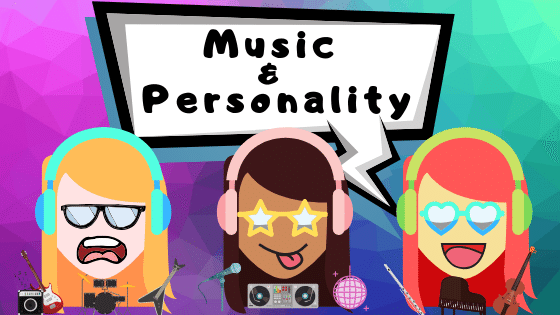Today’s general English article is about music and adjectives of personality – how the music we listen to can actually say a lot about the type of person we are. Did you know researchers can now accurately predict how creative, open-minded or selfish someone is after listening to 10 of their favorite songs? That our taste in music and our personalities are linked might explain why we always want to know what kind of music they enjoy listening to when we meet someone new. Most of the time, if two people like the same type or genre of music it’s easy for them to *get along, on the other hand, finding out that someone hates your favorite artist or band can be a big turn-off! So, is judging others based on the music they prefer smart or shallow? What kind of music do certain personality types listen to more? Keep reading to *find out.
Grammar topics in this article (with links to explanations)
This article contains examples of these grammar structures within the text which are marked with an asterisk (*). Click the links below for more information on these grammar topics or look through our grammar index.
Verb patterns:
- Verbs of preference + gerunds e.g. to like listening to
- Gerunds for nominal concepts, e.g. the idea of liking music
- Passives
Modals of probability
- may, might, could
Adjectives of personality and Comparatives
- -er and more adjectives
Conditionals
Vocabulary glossary for difficult words contained in this article
Vocabulary:
Here is a list of words related to music and adjectives of personality that you might not understand.
Open-minded- will consider new ideas and concepts, won’t pre-judge things.
To be into – to enjoy, be a fan of
Selfish- someone who only thinks of themselves/doesn’t consider others.
Taste in… (e.g. music, books, fashion, etc.)- someone’s preferences in an area
A turn-off- something that causes someone to lose interest or feel disgusted
Shallow 1. Not deep, e.g. shallow water, 2. Superficial, e.g. a shallow person
IQ- abbreviation of intelligence quotient
Survey- a document used to question and collect information about a group of people.
Mainstream- selfish something that is popular or conventional
Extroverted- someone who is social and confident around others
Introverted- someone who is reserved and is more timid around others.
Self-esteem- confidence in one’s own abilities/value
Outgoing- somebody who likes socializing with others, i.e. likes going out with friends
Self-centered- similar to selfish, someone who only thinks of themselves
Head-strong- someone who doesn’t change ideas easily/ (very) determined
Assertive- to be very confident/forceful
Researching the impact of music on personality
Music is a huge part of our culture and from experience, many people feel that different kinds of music can have a big effect on them. Music can change our moods or help us relax, concentrate or exercise. So it’s not surprising that scientists and researchers have been very interested in studying the different ways music can influence us, and the adjectives of personality that we can use to describe ourselves. For example, you might remember hearing in the news that people who listen to more complex genres like jazz or classical music have higher IQs [1]. Or that young students who are into rock and metal are more talented and do better at school than their classmates [2]. The study we’ll focus on today is from a British psychologist Dr. Adrian North and his team of researchers. In total, they surveyed over 36,000 people from more than 60 countries all over the world. The psychologists asked participants to rate 104 different genres of music and answer questions about different areas of their personality. The aim of the study was to find out if there was a link between liking different types of music and having certain personality traits. Below are the main results for some of the most popular genres.
Adjectives of personality to describe pop music fans
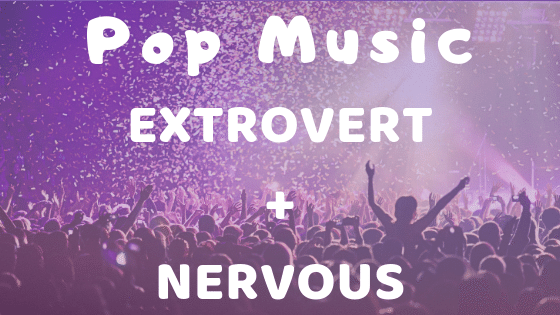
Are you the kind of person who prefers to listen to the top 40 hits and likes to *keep up to date with the newest mainstream sounds? If yes, then chances are that you also tend to be extroverted, sociable and honest. The research also showed that other adjectives of personality we can use to describe lovers of pop music are hard-working and self-confident. But, on the downside, they do tend to be less creative than others and worry or get nervous more easily.
Hip-Hop music fans are energetic and enjoy socialising

Even though there is a stereotype that people who like rap music are more aggressive or violent, the researchers didn’t find any evidence that supported this idea. Instead, rap and hip-hop fans are energetic listeners, who, like the rappers they love listening to, are very extroverted and have high self-esteem. Similar to pop fans, they also tend to be more outgoing and enjoy socializing while listening to their favorite music.
Rock Music and adjectives of personality
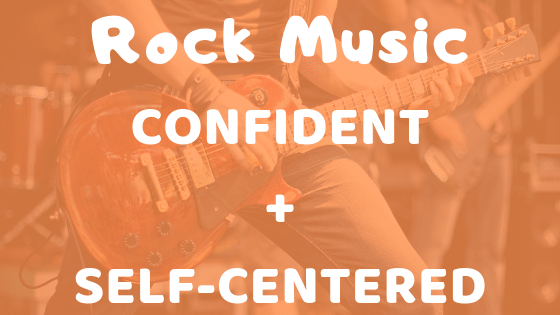
Rockers- especially those who love classic rock from the 70s, and 80s- are usually hard working, quite confident and at ease with themselves. The main disadvantage of this is that they can be more self-centred than other listeners, making them less open-minded towards other genres. If you have ever heard two rock fans argue over which artists they think are better than others, you’ll already know how head-strong these fans can be!
Adjectives of personality for metal music fans

Although metalheads might look very aggressive and the music is often loud, heavy and dark, the researchers found that fans of this style are actually quite gentle people. They tend to be very creative and intuitive, liking to reflect on ideas and concepts, but are also often introverted and might have lower self-esteem than others. Dr. North stated that, interestingly, those who like metal have a very similar personality to people who like listening to classical music, except that they are usually younger [4].
Lazy personality types listen to Indie music

Do you love discovering underground bands and niche artists? Then, as a fan of the indie genre, you are typically quite intellectual and creative. However, the study also found that those who like indie music tend to be lazier and more introverted than others. Like pop fans, they too can become anxious easily, while on the other hand, they don’t have as much confidence as their chart-loving friends.
Dance Music
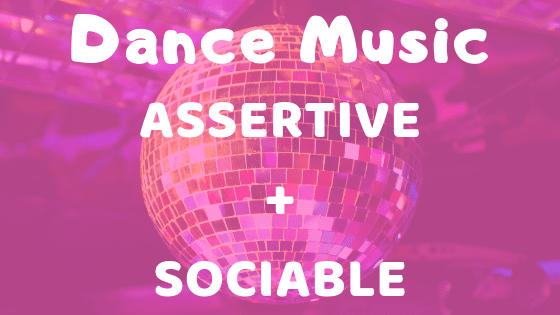
Do you enjoy fast-paced rhythms, strong beats and dancing all night long? Then, according to psychologists, you are very outgoing and assertive- you do what you want, when you want. Unsurprisingly, fans of dance music are also some of the most sociable listeners, which must come in handy if you plan on going to a party, club or festival, where you’ll definitely *bump into lots of new people.
Classical music and personality adjectives
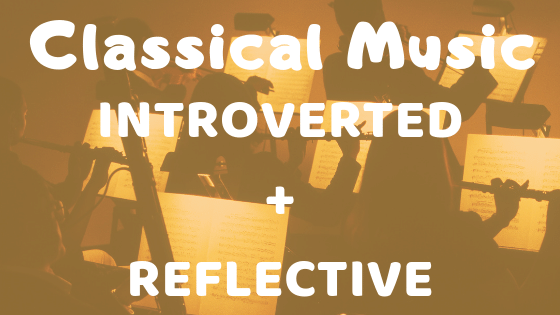
Do you appreciate the arias, symphonies and concertos of the past? If you do, then you are usually a creative person who has good self-esteem and feels at ease with themselves and the world around them. Although fans of classical music can be more introverted than other listeners, like fans of metal, they enjoy music that is more complex and makes them think and reflect on things. You also might be smarter on average than others: even though it might sound like a cliché, some studies have shown that listening to Mozart’s music can help you improve certain mental tasks. We call this “The Mozart Effect”.
Country music and related adjectives of personality
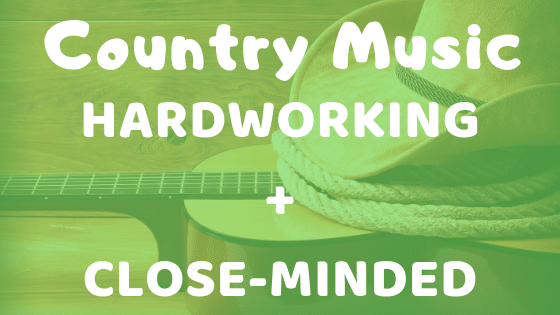
Do you have a thing for cowboy hats, boots and acoustic guitars? Then, as a country music fan, you are typically hard-working, sociable and have traditional beliefs. While country songs often talk about sad topics such as *breaking up and relationships ending, the people who like this genre tend to actually be very emotionally stable. Empathy is another personality aspect that we can connect with country music lovers! However, they may be very close-minded towards other types of music.
Jazz, Blues and Soul Music

People who enjoyed these genres were typically more extroverted with high self-esteem. They also tended to be very creative, intelligent, and easy-going. Similar to classical listeners, jazz fans are reflective and tend to be very open-minded, with more liberal beliefs. Like metal fans, people who like jazz generally have more gentle personalities.
Music and Identity
The above results show that you can get a rough idea about someone’s personality just by knowing what kind of music they listen to. The study also helps us understand why people sometimes feel defensive about their taste in music since our preferences reveal quite a lot of information about ourselves, and the music we like often becomes part of how we define ourselves and relate to others. This is especially true among younger people, where listening to certain bands or artists is either cool or not among friends, with statistics indicating that children and teenagers listen to almost three hours of music a day [5]! It just goes to show how much of an important part of our lives music can be.
Should we judge a person by their tastes?
In summary, Dr. North’s research is very interesting but it does have a few issues, just because you don’t quite like another person’s Spotify playlists doesn’t mean your personalities are too different to *hang out or be friends. First of all, many people have more than one favorite genre of music which is totally normal, and secondly, using surveys to collect data means that participants can sometimes lie and not report what they actually listen to. In the end, we can use someone’s preferred kind of music as a way of getting a first impression of the kind of person they are, after that, it’s up to us to find out more about them. The great thing about music though is that most of the time it brings people together, regardless of where they come from or the language they speak. Does your favorite music genre match your personality according to the list above? Do you agree that tastes in music and adjectives of personality are related? Let us know in the comments!
References:
[1] Rentfrow PJ, Goldberg LR, Stillwell DJ, Kosinski M, Gosling SD, Levitin DJ. The Song Remains the Same: A Replication and Extension of the MUSIC Model. Music Perception: An Interdisciplinary Journal. 2012;30(2):161-185. doi:10.1525/mp.2012.30.2.161.
[2] National Academy for Gifted and Talented Youth (Cadwaller, 2007).
[3] Individual Differences in Musical Taste, ADRIAN C. NORTH, The American Journal of Psychology, Vol. 123, No. 2 (Summer 2010), pp. 199-208
[4] Preferred Music Style Is Tied to Personality By Jane Collingwood

This article was written by Break Into English’s blog contributor Ilaria Marazzina.

